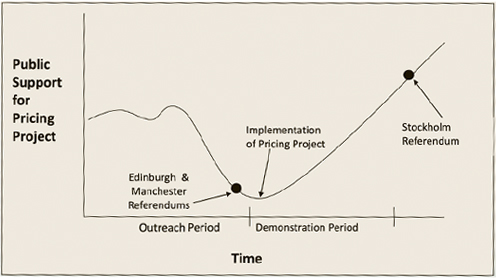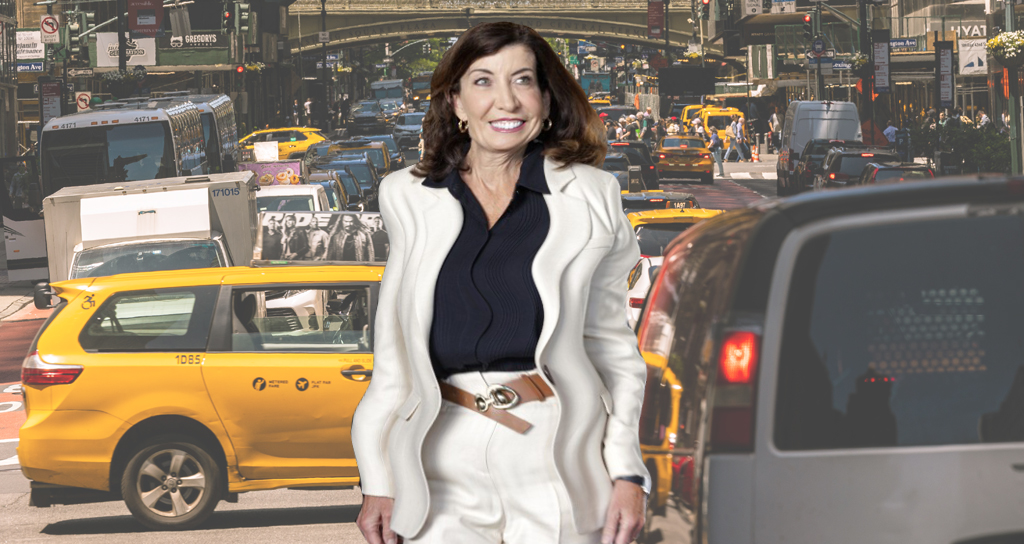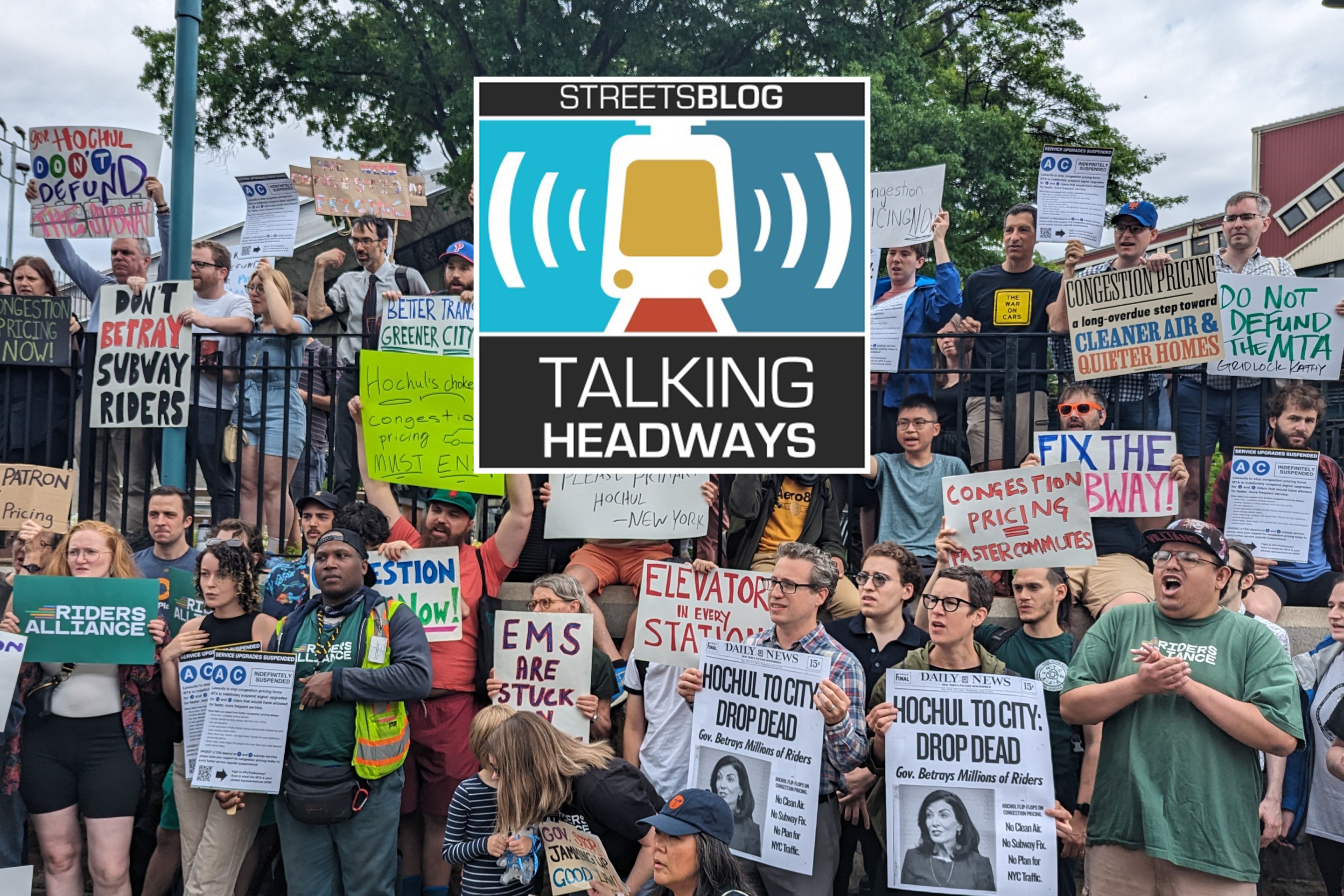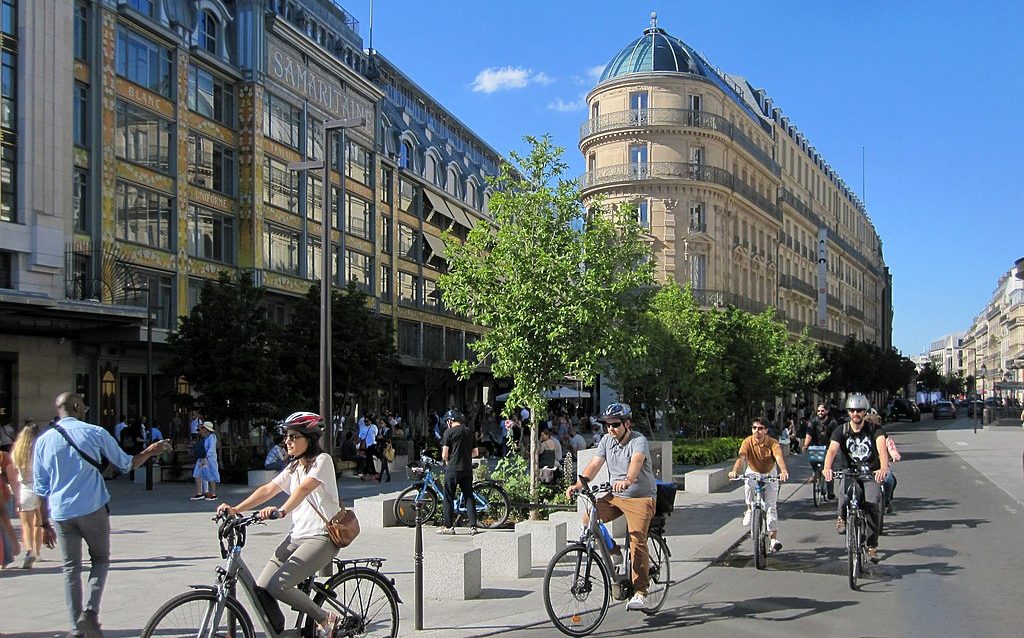New Yorkers woke up to the news on Wednesday that their governor had indefinitely delayed the state's congestion pricing plan just 25 days before it was about to begin.
To summarize: Congestion pricing would raise $1 billion in revenue annually through a toll on drivers entering Manhattan's central business district. The revenue would go into a lockbox for repairs, modernization and expansion of the regional transit system, which is (in the words of the governor herself) the "lifeblood" of a metro region where the vast majority of people get around on trains and buses.
The plan was always controversial — polls currently show a majority of city and suburban residents oppose it — but advocates have rightly pointed out that opponents are simply advocating for a status quo: drivers continuing to congest the roadways without paying even a small amount to mitigate the deleterious effects of their cars.
Hochul's capitulation to car culture goes far beyond the impact in New York City. Here are three ways that Hochul's decision will effect the nation:
1. It will discourage other cities
Across the country, federal, state and local officials have been watching — literally for decades — New York's torturous path to finally passing and implementing congestion pricing, viewing it as a possible model for other cities' plans.
In Boston and San Francisco, for example, congestion pricing had been discussed, but the debate jumped from pie-in-the-sky to dessert on the plate after the federal government finally signed off on New York's plan in May.
State Sen. Brendan Crighton, co-chair of the Massachusetts Legislature's joint committee on transportation, told WBUR that he was closely monitoring New York City’s rollout.
"Certainly [it] could inform us as how viable of an option could congestion pricing be," he said, "as compared to some of the other options we're looking at.”
2. It hurts the national economy directly
It's important to also point out that the tens of billions that the MTA spends on capital work — repairing and upgrading the New York region's lifeblood network of rail and bus lines — floats economies across New York state in the form of contracts with local companies.
As Streetsblog has reported, every single state Senate and congressional district within New York State is home to firms that receive MTA payments, with $26 billion spent from 2014-2022, creating tens of thousands of jobs.
But it's also true for companies based in New Jersey, where local politicians fought congestion pricing, and the nation.
Between 2011 and 2018, the MTA bought $8 billion in goods and services from companies outside of New York State — boosting the economies of localities from sea to shining sea.
"One-third of all of the MTA's spending during that period — $8 billion over eight years — was done outside its home state," said Rachael Fauss of Reinvent Albany, the good-government group that crunched the numbers. "We estimate 100,000 jobs were created."
3. It will discourage politicians from taking on tough challenges
Anyone who studies congestion pricing will soon look over the ridge and down into the “Valley of Political Death.” That's the term congestion pricing proponent Daniel Firth gave to the unique narrative arc that the new tolls followed.
He represented it like this:

And the details of that graphic provide two case studies: In two English cities, the public rejected congestion pricing in a referendum, and politicians let it die.
But in Stockholm, politicians implemented congestion pricing just as opposition was at its height — but after a six-month demonstration, the public backed a full-blown tolling system.
Why? Because they got to see the benefits of it. As I discovered during my May fact- and fish-finding trip to Stockholm, the opposition has all but evaporated.
"People said, 'Why are you taxing me to do something I've always done for free,'" said Jonas Eliasson, who had been instrumental in the Swedish capital's rollout of congestion pricing in the mid-aughts. "But then when it is implemented, and people can see that it works, it becomes very popular."
If politicians have the courage, they will reap the rewards as roads decongest and opposition recedes.
Opponents, Eliasson told me, "see two things: First, is the obvious reduction in congestion, which no one believed would happen. When people saw a 20-percent reduction, they said, 'OK, so this is what they were talking when they said the congestion was going away.' And you could see with your naked eye.
"Second, the biggest thing is just the psychological effect of having to pay at all — we went from zero to a few dollars, which means people consciously make a decision each time they make a trip: Is it worth it today for this particular trip to use my car or should I take a bike today or take the bus? It's not like everyone abandoned their cars. But they suddenly made one-fifth fewer trips in their car because they were thinking about it."
In New York, advocates seem to be particularly enraged by the lack of follow-through from Hochul, who as recently as last week was hailing congestion pricing as the silver bullet for the regional economy.
"Almost exactly one year ago, after a week where poor air quality turned the sky orange in New York, Gov. Hochul proudly presented the Biden administration’s green-lighting of congestion pricing," the Tri-State Transportation Campaign said in a statement that referred to the "Valley of Political Death." "Now is the time for bold, strong leadership. We urge the governor to have the courage to stick to her guns and implement this transformative policy."
And consider how bad it looks for a Democrat to shelve a bold plan for tackling a key element of climate change. The party is already subject to mockery by lib-owning right-wingers for its supposed hand-wringing over policy and also for its belief that climate change is happening and is harming our society.
So when the Democrats can't even follow through, it really demoralizes their base.
"We are living in a bad episode of 'The Twilight Zone,'" said Carlo Scissura", the Democrat-backing head of the hardly left-of-center NY Building Congress. "[The delay is] a devastating blow to commuters, to the hard-working men and women of the construction industry, and to our city’s workforce, all of which will suffer greatly as a result – as will all New Yorkers."
When the last lingering Democrats among the construction trades chastise a top party standarbearer for operating in a fantasy world, one has to wonder if there will ever be blue-collar support for Democrats again.
As such...
4. And it won't even save democracy
In breaking the story late on Tuesday night, the New York Times and Politico both pointed out that Hochul had made the decision, in part, to help Democrats regain the House of Representatives by taking off the table a controversial issue for suburban New York voters — the very same voters who flipped several reliable blue seats red in 2022.
Hours after the news broke, Hochul released a speech in the style of a hostage video to explain her decision. It's worth watching because it's a depressing counterpoint that politics is the art of the possible:
Virtually everything Hochul said — her talk of the struggles of working people, that New York's pandemic recovery would be undermined if drivers are charged a small fee to a small spot on the planet that happens to have abundant transit, that work-from-home has changed the equation — is simply untrue: virtually all working people in New York take transit, the city's pandemic recovery has, in fact, featured a more-than-full return of car traffic, and that traffic has spread because of work-from-home.
And her speech emboldens the opponents of congestion pricing — who have filed several overlapping lawsuits — by using some of their own rhetoric, including suggesting that congestion pricing is indeed another part of the supposed class war undertaken against suburbanites, drivers, Republicans, the rich, the poor — whomever — undertaken by the "woke" left (as one Republican New York City Council member has been saying to anyone who will listen).
As a result, American democracy — which Hochul believes she is bolstering — actually gets undermined. (It's no surprise that former and likely future president, Donald Trump, has been lambasting congestion pricing and promising his base that he'd repeal it if he wins in November.)
“Gov. Hochul's decision to delay congestion pricing tells subway and bus riders they don't rank," said Natasha Elder, the city's director for the New York Public Interest Research Group. "Congestion Pricing was passed by the Legislature in 2019 after a years-long campaign, good faith advocacy, policy review, and negotiations, followed by a multi-year review and public engagement process."
Another good-government group, Reinvent Albany, focused on the cynical notion that capitulating to suburban drivers will save democracy.
"She should not fall prey to the myth that defunding vital government programs will help Democrats at the polls," the group said in a statement. "New York State Democrats agreed to repeal the Commuter Tax in 1999 in a cynical move to try to improve their electoral chances, and it didn’t work, and instead has cost the city billions."
New York City's Public Advocate also chimed in on the politics.
"An indefinite pause on congestion pricing will do irreparable harm to the city while undermining public confidence," Jumaane Williams said in a statement. "No version of congestion pricing was going to make everyone happy. No policy ever does. That doesn’t detract from the reasons it was developed – to reduce vehicle congestion, protect our environment, and improve our public transit infrastructure – causes which the governor has now put second to politics."






